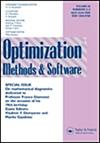Computing the Combinatorial Canonical Form of a Layered Mixed Matrix
IF 1.4
3区 数学
Q3 COMPUTER SCIENCE, SOFTWARE ENGINEERING
引用次数: 1
Abstract
This paper presents an improved algorithm for computing the Combinatorial Canonical Form (CCF) of a layered mixed matrix which consists of a numerical matrix Q and a generic matrix T. The CCF is the (combinatorially unique) finest block-triangular form obtained by the row operations on the Q-part, followed by permutations of rows and columns of the whole matrix. The main ingredient of the improvements is the introduction of two precalculation phases. Computational results are also reported.计算层状混合矩阵的组合标准形式
本文提出了一种计算由数值矩阵Q和一般矩阵t组成的层状混合矩阵的组合标准形式(CCF)的改进算法,CCF是通过对Q部分进行行运算,然后对整个矩阵的行、列进行置换得到的(组合唯一的)最优块三角形式。改进的主要成分是引入了两个预计算阶段。并报道了计算结果。
本文章由计算机程序翻译,如有差异,请以英文原文为准。
求助全文
约1分钟内获得全文
求助全文
来源期刊

Optimization Methods & Software
工程技术-计算机:软件工程
CiteScore
4.50
自引率
0.00%
发文量
40
审稿时长
7 months
期刊介绍:
Optimization Methods and Software
publishes refereed papers on the latest developments in the theory and realization of optimization methods, with particular emphasis on the interface between software development and algorithm design.
Topics include:
Theory, implementation and performance evaluation of algorithms and computer codes for linear, nonlinear, discrete, stochastic optimization and optimal control. This includes in particular conic, semi-definite, mixed integer, network, non-smooth, multi-objective and global optimization by deterministic or nondeterministic algorithms.
Algorithms and software for complementarity, variational inequalities and equilibrium problems, and also for solving inverse problems, systems of nonlinear equations and the numerical study of parameter dependent operators.
Various aspects of efficient and user-friendly implementations: e.g. automatic differentiation, massively parallel optimization, distributed computing, on-line algorithms, error sensitivity and validity analysis, problem scaling, stopping criteria and symbolic numeric interfaces.
Theoretical studies with clear potential for applications and successful applications of specially adapted optimization methods and software to fields like engineering, machine learning, data mining, economics, finance, biology, or medicine. These submissions should not consist solely of the straightforward use of standard optimization techniques.
 求助内容:
求助内容: 应助结果提醒方式:
应助结果提醒方式:


